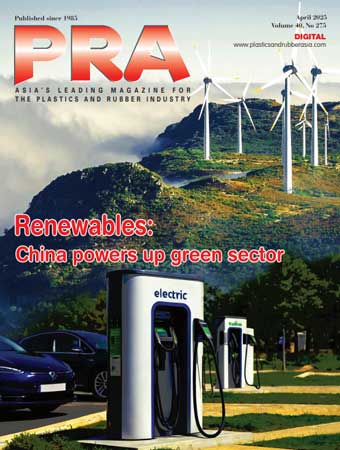Breaking the waste cycle with circular responsibility
Emerging solutions to plastic waste deliver a clear message: industries, communities, and individuals must share responsibility in a circular system, adds Angelica Buan, in this interview conducted with PCX, which offers solutions to help companies meet their sustainability goals and recently launched its recycled plastics platform.
Waste crisis rising

Among the dissenting voices on rising plastic waste, the United Nations Environment Programme (UNEP) has expressed concern over the worsening state of the environment. It reports that more than 20 million tonnes/ year leak into waterways and aquatic ecosystems. With plastic consumption continuing and 430 million tonnes/ year produced, the volume of plastic waste is projected to triple by 2060.
To prevent this, UNEP cites proven solutions: reducing plastic use, using non-plastic alternatives, redesigning products for reuse, repair, and recycling; and improving waste management systems.
ASEAN Plus Three: a plastic waste hotspot

Over in the ASEAN region, which comprises Thailand, Indonesia, Malaysia, Singapore, Philippines, Vietnam, Cambodia, Laos, Myanmar and Brunei, plastics use surged nearly nine times, from 17 million tonnes in 1990 to 152 million tonnes in 2022.
This was largely made up of single-use packaging, according to the Organisation for Economic Co-operation and Development (OECD) report, Regional Plastics Outlook for Southeast and East Asia, published in July 2025.
Meanwhile, when combined with Japan, China, and Korea, under the grouping collectively known as ASEAN Plus Three (APT), the region constituted nearly a third of global plastics use. Annual per capita consumption ranges from 32 kg in lower-middle income ASEAN states to over 100 kg in Japan, Korea, and most high-income and upper middle-income ASEAN members.
Most APT countries have national action plans on plastic pollution and cooperate regionally, which may account for their recycling rates being pegged at 12%, already above the global average of 10%. Still, nearly a third of plastic waste is mismanaged, particularly in ASEAN’s low-middle income countries and rural China, where open burning and dumping persist.
PCX Markets: closing the loop with circular plastics
Amid growing pressure on manufacturers and brands to reduce their carbon footprint, Singapore-headquartered PCX Markets, the “plastic responsibility platform” of the Manila-based non-profit organisation PCX, provides upstream and downstream solutions to help companies meet their sustainability goals, and move along initiatives aimed at reducing plastic waste.
PRA interviewed PCX Markets’ CEO Sebastian Di Grande to learn how the company serves as a linchpin in the plastic recycling and sustainability chain, helping brands access responsible plastic solutions.
PRA: How is PCX addressing the global and Asian plastic waste situation?
Di Grande: PCX Markets work with brands to meet and exceed regulatory requirements through a portfolio of solutions, including plastic clean-up credits, verified recycled resin and upstream reduction consulting.
Since 2019, we have built one of the world’s most trusted networks of waste recovery and recycling partners, generating real impact for communities, ecosystems, and supply chains.
Verified plastic credits can help close the funding gap, connecting brands that want to fund downstream cleanup with project partners that need additional funding.
Currently, only 9% of plastic waste is recycled, 19% incinerated, and 72% landfilled, dumped, openly burned or ends up in the environment. As per UN estimates, we need to invest US$1.64 trillion to beat plastic pollution by 2040.
The ASEAN region is at the epicentre. According to the World Bank, half of the top ten countries contributing to plastic leakage to rivers and seas are located in Southeast Asia.
Emerging markets, however, received only 6% of plastic circularity investments between 2018 and 2023, according to The Circulate Initiative. A recent World Bank report estimates there is a gap of US$28-US$40/tonne for plastic waste collection and US$24-US$40/tonne across plastic recycling value chains in the Philippines, Indonesia, Thailand and Vietnam.
We launched PCX Circular Plastic, which offers the option to bundle plastic credits with verified recycled resin produced by the same project partners.
PRA: What is the purpose of PCX launching the recycled plastics product?
Di Grande: PCX Circular Plastic is a pioneering solution that gives brands the opportunity to fund audited clean-up of plastic pollution and source a steady supply of recycled resin from verified recycling partners.
Companies that choose PCX Circular Plastic can be assured the PCR content they’re buying comes from recycling projects that have been audited according to rigorous, third-party standards that include environmental, social, labour and workplace safeguards.
Our goal with PCX Circular Plastic is to accelerate the transition to a truly circular economy for plastics. By offering high-quality, verified PCR resin, we help brands replace virgin plastic with material that has already been used and recovered, reducing demand for new fossilfuel-based plastics and keeping valuable resources in circulation.
By choosing PCX Circular Plastic, businesses become part of a global ecosystem accelerating the transition to a circular economy. When businesses invest in this solution, they’re not just meeting their recycled content targets, but also closing the funding gap for waste management solutions in markets that need it the most, and creating jobs in communities hardest hit by the plastic pollution crisis.
(PRA)SUBSCRIBE to Get the Latest Updates from PRA Click Here»










